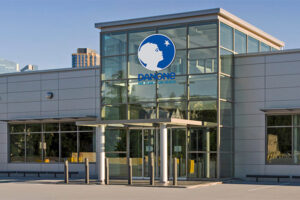The role that people play at the point of sale (POS) is undoubtedly crucial to the success of retail and the customer experience in order to differentiate it from online retail. Thankfully, there is still a large group of customers who enjoy shopping and use brick-and-mortar retail to do so. The quality of the customer experience is often dependent on the interaction that takes place at the POS.
However, there are challenges on the employee side, such as low pay and low motivation, that need to be addressed. There needs to be a greater focus on people at the POS. After all, customer loyalty and the customer experience are not in danger of being replaced by AI any time soon. In times of isolation, in particular, people seek out social contact at retail stores. Perhaps rethinking retail and putting the emphasis back on interpersonal interaction, conversation, and social contact would be a good approach? Why not offer gastro services, coaching sessions, or topic-specific presentations? Such measures would also change the role of the traditional retail employee.
People Want to Be Acknowledged and Appreciated
Only those who regularly receive recognition and appreciation will perform well, remain with a company for longer periods of time, and pass on the corporate philosophy to customers. Therefore, we urgently need to consider how we can create better framework conditions and, above all, change our management behavior. We are well aware that people come because of the brand, stay because of the job, and leave because of the manager. Consequently, managers have a key responsibility when it comes to ensuring a good working atmosphere, respectful communication, and personal support. Communication with your own employees should not be seen as a “nuisance” and take place on the fly, but should be given the appropriate setting and attention. The call to action is clear: Let’s treat our employees as if they were our customers. The time has come to reconsider this issue.
A few relevant questions to be asked include: What do the staff areas look like? What flexibility can I offer? What additional benefits are available? Are there any employee events? How is communication carried out? What does the remuneration system look like? In this respect, there is a lot to be learned from the start-up scene. It is true that the salary is a key factor when it comes to satisfaction. However, the start-up scene, in particular, does not pay top salaries, yet highly qualified people who are very committed to their work can be found there, precisely due to the fact that the sense of community, the hierarchies, and the will to innovate are often different from what can be found at long-established companies.

The German drugstore chain dm has been one of the top employers for many years. The company focuses on personal responsibility, participation, and the promotion of its employees. The company sees its employees not as a cost block, but as an investment. For many years, the company has also paid dividends to employees when the company generates good earnings.
credit: dm
The Point of Working in Retail
It makes sense to invest in the proverbial purpose in this regard. That might take the form of workshops, a change in mindset, a new leadership approach, or a new corporate culture. Most importantly, recruiting and employer branding should be given a new level of significance within the company. It simply must become a core topic and not a side issue. Professional, qualified HR staff are needed to deal with HR policy – from procurement to administration to personnel development.
It’s time to rethink how we deal with employees at the point of sale and what attention they receive. It is not only customers who want individual support and solutions – employees do as well. A stronger focus on the needs of employees will certainly pay off. In order to compete with online retail, a focus on trust, advice, and individual service will be necessary. If you want to offer your customers 5-star service, you not only have to show your employees what that looks like, but also how it feels. We still want people in retail, not robots; employees want respect and compassion. Those who have a clear understanding of this definitely have a competitive advantage.
The Money Factor
Even though we demand a lot from people at the point of sale, whether in retail, gastronomy, or the service sector, and we repeatedly refer to them as pillars to the system – they are the lowest paid workers in many European countries. They also usually come last in rankings relating to appreciation and recognition. Those low salaries are the result of a rather poor level of education. Interestingly, pay in the retail segment improves the further away the actual workplace is from the customer. The conclusion is obvious: Excellent customer service, great advice, and a high degree of flexibility have no value in our working world.
This is another area in which the remuneration system needs to be rethought, especially during times of an employee market. Simply paying on the basis of a collective agreement will certainly not work in the long term. We need to counteract the poor pay and unsatisfactory framework conditions in the retail sector and increase employee motivation. What might that look like in concrete terms?
Proposed Solutions for Retailers
The absolute prerequisite is to focus on people who like to be “hosts”, enjoy dealing with people, are curious about approaching people, and love the daily challenge of working with different people. During job interviews, 99% of applicants say that they would like to work with people, so why not in retail?
- Performance-Based Remuneration
– Implementation of performance-based remuneration systems, in which good performance and advice are financially rewarded. Bonus systems linked to sales targets and customer satisfaction can increase motivation.
– Implementation of recognition programs for good performance (awards, etc.) - Salary Structure Transparency
Clear communication about salary structures and promotion opportunities in order to show employees their prospects and objectives - Flexible Working Conditions
Introduction of flexible working hours or part-time work to give employees more control over their work situations and, most importantly, adequate communication – perhaps in the form of an app or digital solution - Social Benefits and Additional Benefits
Offer of attractive social benefits, such as health insurance, a company pension scheme, and employee discounts
Additional incentives, such as free training or further development opportunities. - Promotion of Career Development
– Creation of clear development paths and promotion opportunities within the company
– Investment in training and further development to improve employee qualification - Industry-Wide Standards
– Collaboration within the retail industry to establish industry-wide standards for fair pay
– Participation in initiatives to improve working conditions in the industry and corresponding communication - Corporate Culture and Appreciation
– Promotion of a positive corporate culture that shows appreciation for the work done by employees
– Open communication and involvement of employees in decision-making processes - Customer Awareness
– Raising customer awareness of the importance of fair pay in the retail sector
– Customers who support companies that pay fair wages can contribute to positive change - Culture of Communication
Promotion of an open communication culture aimed at obtaining employee feedback
It is important to emphasize that solving the problem of poor pay in retail often requires a combination of several measures. A holistic approach that takes into account the various aspects of employee motivation and development is likely to be more effective in bringing about long-term positive change.

An important aspect of employee development is to listen to their ideas and suggestions – this is especially true for young employees. Redevco’s management introduced a NextGen Board for young talent within the Redevco organization in Europe to bring together the next management generation and to address the topics of the future. Together, the young professionals form more than just a sounding board for the management of one of Europe’s largest private real estate investment managers – their task is to actively help shape its future.
credit: Redevco
Consequence of Inaction
The lack of qualified employees in the retail sector will lead to serious consequences for the industry. If nothing is done to improve the image of retail, only those who would otherwise not be able to find a job will choose to work in the industry.
A diminished customer experience will drive people even more towards online retail and, consequently, reduce sales for those who do not have online stores. Additional sales and qualified advice will be lost as a result. However, the few who understand how to rely on their employees at the point of sale will be able to perform better and will be at a competitive disadvantage.
Good employee support and qualified personnel management will also have a positive effect on innovation and creativity as well as productivity, as motivated employees are more involved, contribute their thoughts, and are interested in helping the company move forward. In our fast-paced world, being able to adapt and react quickly is essential.
A lack of qualified employee support, on the other hand, will result in high staff turnover, which is a disaster for any company that works directly with customers. Know-how will migrate, continuity and the working atmosphere will deteriorate, and the negative image will attract even fewer new employees.
In order to overcome the challenges, investing in employee training and development, ensuring fair pay, and creating a positive working environment are crucial. Companies must also implement employee retention and development strategies to attract and retain qualified talent. Most people are keen to further their training and are interested in investing in their own personal development, so offer opportunities for both personal and professional development.
Digital and Technological Change
The use of AI, IoT, and big data does not stop at the retail sector. Those areas have the potential to make retail more exciting again. Develop your employees in those specific areas; the younger generation, in particular, is extremely interested in technology. Digital and technical skills will also become increasingly important, so showcase them in job advertisements and image campaigns.
A customer-centric approach will require your employees to not only provide personalized customer experiences, but also to request and support them. That will allow for more varied tasks involving cross-training and digital support. Provide them with the opportunity to develop into the digital business where appropriate.
Sustainability and Ethics
Employees who are dedicated to such issues will also be needed, which will attract a completely new target group and further enhance the value of positions at the point of sale. Customers are attaching greater and greater importance to sustainable and ethical practices, and applicants want to work for employers that value sustainability. This should be addressed and communicated in an appropriate manner. Such issues are particularly important to female employees.
Diversity and Inclusion
The retail sector lends itself to creating a diverse workforce, which is appreciated by both employees and customers and creates an open corporate culture of integrity. Target groups that have not previously been considered can also be reached in this regard: career changers, those over the age of 50, people returning to work, people with special needs, and people with different ethical backgrounds.
Ultimately, as previously mentioned, most people love interacting with other people. Building relationships and giving advice, having social interaction – those things should be encouraged more within companies. It also provides a great environment when it comes to staying on top of trends and changes. That is one advantage that can be further emphasized and developed.

Manuela Lindlbauer
Manuela Lindlbauer is the owner of Lindlpower Personalmanagement, which is based in Vienna, Austria.







